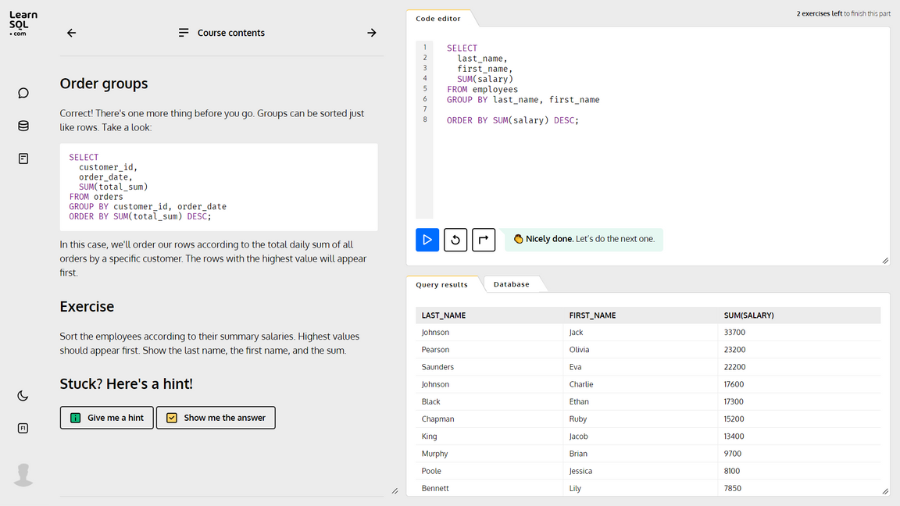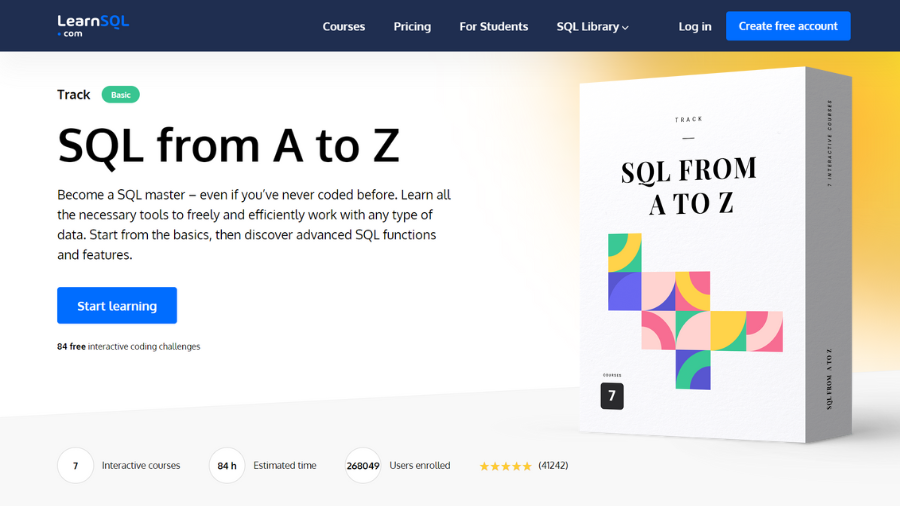
If you've ever wondered about the best way to learn SQL, you're in the right place. Whether you're a complete beginner or an experienced professional looking to upskill, this comprehensive guide will show you the way.
In today's data-driven world, you can think of data as a treasure chest full of gold. And SQL (Structured Query Language) is your personal key to unlocking it. SQL is a potent tool that allows you to communicate with databases, enabling you to extract, shape, and make sense of data.
Are you just starting your career path? Or maybe you’re a seasoned professional aiming to broaden your skill set. In either case, mastering SQL can be a game changer. It can open doors to new opportunities and give your career a significant boost.
If you're new to SQL or have no IT experience, don't worry. SQL is a user-friendly language that's designed to be intuitive and straightforward. In fact, many people have successfully learned SQL on their own, starting from scratch. And the best part? You don't need any special software or expensive textbooks to get started. All you need is a web browser, an internet connection, and a willingness to learn.
One of the best ways to learn SQL is through interactive online courses. For instance, LearnSQL.com offers a course on SQL Basics that's perfect for beginners. This awesome online interactive SQL course teaches you the basics of SQL querying, including how to retrieve data from an SQL database and build simple reports. It includes 129 interactive exercises that allow you to practice what you learn, ensuring that you gain practical experience as you progress through the course.
SQL is a standardized programming language that serves as the backbone for managing and manipulating databases. A database is a software product designed to hold large amounts of data in a structured way. It can hold millions of records, which isn't even possible with a spreadsheet.
SQL allows you to perform a variety of tasks, such as:
A key power of this language is that it allows you to create advanced and in-depth reports. With the right queries, you can pull out specific information from a database to create the listings and comparisons you need. In today's world, such reports are often the basis for strategic decisions. If you want to know more about this, check out our SQL Reporting track.
SQL is used by a wide range of professionals, from data analysts and data scientists to software developers and IT administrators. It's a language that transcends industries and job roles, making it an essential skill in today's data-driven world.
The history of SQL is a fascinating journey that began in the 1970s. If you're interested in learning more, read The History of SQL – How It All Began.
SQL is not just a relic of the past, though. It continues to evolve and adapt to the needs of the modern world. Over the years, this database language has become an industry standard, recognized and used by all major organizations. It's the basic language for working with databases, used daily by market giants such as Google and Facebook for a variety of processes.
With the rise of Big Data, companies across all industries are looking for professionals who can analyze and interpret data to make informed business decisions. SQL is one of the most sought-after skills in the job market, so learning it can open up a wide range of opportunities. It’s currently one of the fastest-growing branches of the IT industry, making SQL professionals in high demand.
According to Glassdoor, the average salary for SQL jobs in the United States is around $84,000 annually, with some roles paying over $100,000 per year. Pretty sweet, right?
But the most important question is… Is learning SQL enough to get a job? While SQL is a highly sought-after skill, most jobs will require additional skills. For instance, data analysts are often expected to know other tools like Python, R, and Excel. However, knowing SQL can significantly increase your job prospects and salary potential.

Can a non-IT person learn SQL? Absolutely! SQL is a user-friendly language that doesn't require a background in IT or programming. It's designed to be intuitive and straightforward, making it accessible to professionals from all fields.
Am I too old to learn SQL? No, you're never too old to learn something new. Whether you're looking to change careers or enhance your current skillset, learning SQL can provide you with valuable opportunities.
When it comes to convenience and flexibility, finding the best way to learn SQL online can offer you the ability to learn at your own pace and in your own space. Interactive online courses, in particular, are the fastest way to learn SQL. But let's take a moment to compare this method to other forms of learning.
While SQL books can be a great resource, they lack the interactive element that online courses offer. You can read about SQL concepts – but without the opportunity to practice and get feedback, it can be difficult to fully grasp these concepts and apply them. Plus, books can quickly become outdated as new versions of SQL are released.
YouTube videos and other free online resources can also be helpful, but they often lack structure and depth. You might find a great video on a specific SQL concept, but piecing together a comprehensive understanding of SQL from disparate sources can be a challenge.
If you insist on watching YouTube, here's what you should check out:
Bootcamps, on the other hand, offer a more intensive learning experience. They can be a great way to learn SQL quickly, but they also require a significant time commitment and can be quite expensive. Plus, the pace of bootcamps can be overwhelming for beginners.
In contrast, interactive online courses like those offered by LearnSQL.com provide a balanced approach to learning SQL. They offer the structure and depth of a bootcamp, up-to-date content, and the flexibility of online videos. You can learn at your own pace, practice as much as you need, and have access to a wealth of resources and support. This makes them the fastest and most effective way to learn SQL.
Let's take a closer look at what such an SQL course should look like.
First, courses are easiest when they’re 100% online. Then you don't have to install anything on your device or configure anything. Everything happens in your browser; all you need is an internet connection.
An interactive online course (like those on LearnSQL.com) gives you the opportunity to write real SQL queries and see them run. In each exercise you have an online console in which you practice what you learn in the exercise - i.e. you immediately practice writing real code that will help you later in your real-world situations. It couldn't be better or easier.

Interactive SQL courses on LearnSQL.com are prepared for all skill levels. Both a complete rookie and an experienced database expert will find something for themselves.
Here are some ideal courses for beginners:
If you don't know which one to choose, check out What Is a SQL Dialect, and Which One Should You Learn? For example, if you're specifically interested in Microsoft's database management system, finding the best way to learn SQL Server will be crucial for you. You can also see our article on the Top 6 Online SQL Courses for Beginners.
And here you have some of the best courses for more advanced users:
Can I learn SQL on my own? Yes, you can. With the wealth of resources available online – including tutorials, online courses, and forums – you can learn SQL at your own pace. However, it's important to practice what you learn through exercises and real-world projects.
Can I learn SQL in 3, 4, or 7 days? While it's possible to learn the basics of SQL in a few days, becoming proficient in SQL takes time and practice. The more you practice, the better you'll get. Fun fact: If you are in a hurry, you can Learn SQL in 10 Minutes!
Why is SQL hard to learn? This is a question often asked by beginners who are just starting their journey with SQL. While SQL is generally considered easier to learn than other programming languages, it can be challenging for beginners. This is often due to the abstract nature of databases and the need to think in a set-based way. However, with practice and persistence, these challenges can be overcome.

SQL is designed to be intuitive and straightforward, making it accessible to professionals from all fields. Its syntax is logical and easy to understand, which makes it a great starting point for anyone new to programming or data analysis. In fact, SQL is often the first language taught in many data analysis and computer science programs because of its simplicity and practicality.
One of the reasons why beginners might find SQL hard to learn is because they're not sure how to approach it. Learning SQL, like any new skill, requires a structured approach and consistent practice. This is where online resources like our SQL From A to Z track can be incredibly helpful. This track offers a well-planned learning path and plenty of opportunities to practice what you've learned. It is a comprehensive learning journey that starts with the basics of SQL, guiding you through creating simple queries and retrieving data from an SQL database.
As you progress through the track's seven online SQL courses, you'll learn how to process various types of data with SQL's most-used functions. You'll also master the art of writing complex SQL queries using aggregation, subqueries, and set operations, and learn how to add, modify, and delete data from a database using SQL. Don't be afraid that you don't understand these concepts yet. With our help, you will soon be able to use them freely.
But this track isn't just about teaching you concepts; it's about providing you with hands-on practice. You'll work with a real code editor and real data sets; you’ll tackle real-life exercises. This practical approach is one of the reasons why the SQL From A to Z track is the most popular track on LearnSQL.com.
After completing each of our courses, you will receive a certificate that you can show to your boss or attach to your LinkedIn profile for recruiters to see.

Here are some articles that will help you avoid roadblocks while learning and practicing SQL:
Another thing that makes SQL beginner-friendly is its practicality. Unlike some programming languages that require you to learn a lot of theory before you can start building anything useful, SQL lets you start working with real data almost immediately. This makes the learning process much more engaging and rewarding. Plus, as you progress in your learning journey, you'll find that the concepts you struggled with initially will start to make more sense.
Absolutely anyone can learn SQL, and I'm living proof of that fact. My journey began as a journalist, far removed from the world of IT. Yet, I found myself drawn to the realm of data, and that's when I discovered SQL.

I took the plunge and enrolled in the SQL Basics course at LearnSQL.com. Despite having no prior IT experience, I was able to grasp the concepts and start writing SQL queries. Now, I use SQL in my daily work and it has opened up a whole new world of opportunities for me. If I – a humanities guy turned SQL enthusiast – could do it, so can you! You can read my story here.
So, what is the best way to learn SQL? I hope I convinced you that the answer is through interactive online courses. This approach allows you to learn at your own pace, practice with real-world examples, and get instant feedback. It's a flexible and effective way to master SQL, whether you're a beginner or an experienced professional looking to upskill.
Learning SQL is more than just a valuable investment in your career. It's a strategic move that can open up a wide range of opportunities and give you a competitive edge in the job market. Employees that know SQL tend to earn more than their counterparts without those skills. This is because many organizations are seeking specialists with database knowledge to stay ahead of the competition and fine-tune their business strategy.
Learning SQL is easy! With a bit of practice, you can quickly get the hang of it. And if you're really serious about learning and becoming an expert, you should consider our All Forever Package, which includes all of our current and future courses.
So, why wait? There's no better time than now to start your SQL learning journey. Make a smart career move and enhance your professional life regardless of your field. Start your SQL learning journey today with LearnSQL.com and unlock the next level of opportunities.